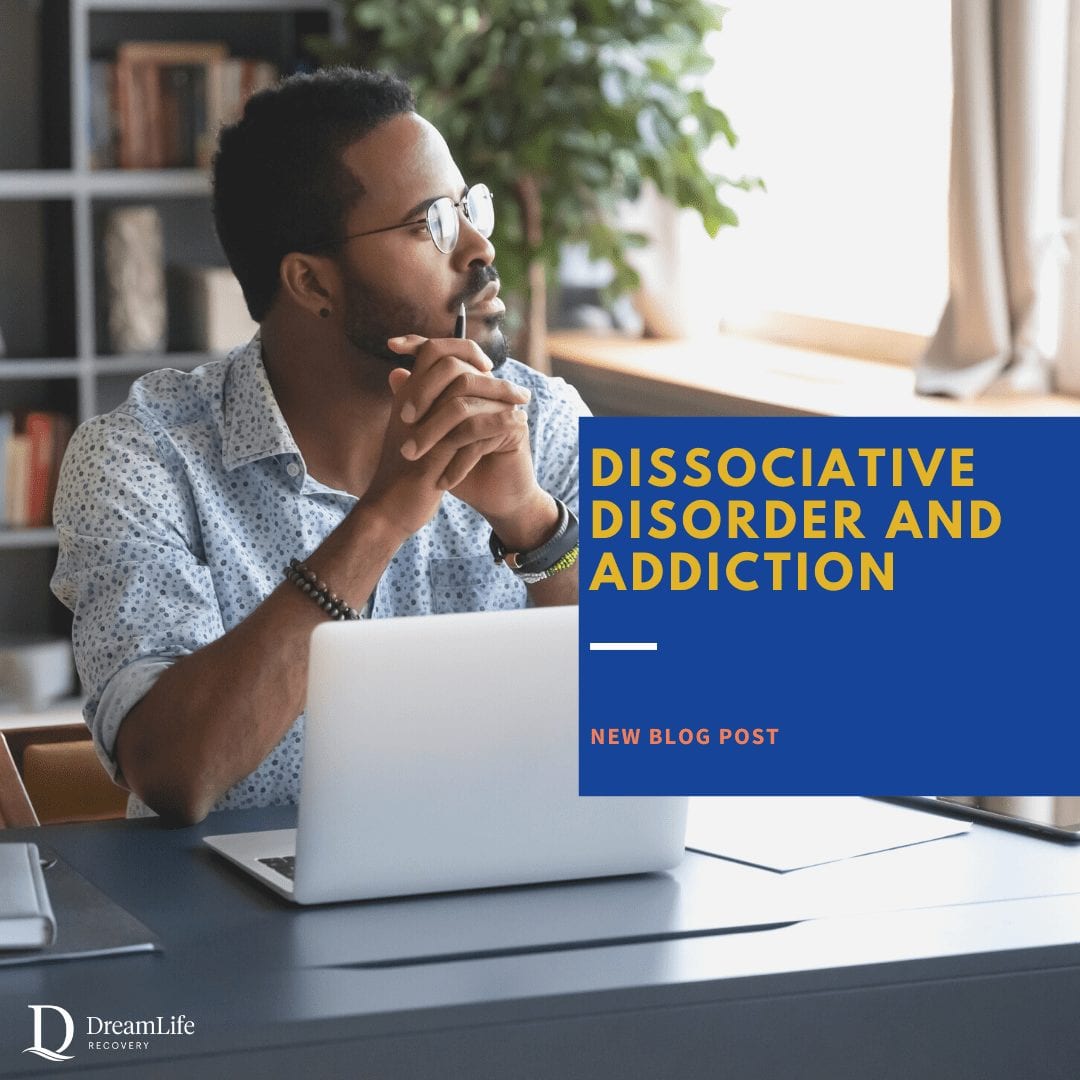Dissociative Disorder and Addiction


Written By
DreamLife RecoveryIf you’ve ever felt absorbed by a really good movie or book and “lost yourself” in it—you have experienced dissociation. Dissociation is when a person experiences a disconnection between their thoughts, feelings, behaviors and their sense of self. Forgetting parts of a drive home or having an “out of body experience,” in which you have a feeling of watching yourself at a distance, are also forms of dissociation.
Dissociation can be normal, but in some cases, particularly for people who have experienced trauma during childhood, it can become an unhealthy coping mechanism and can lead to dissociative disorders later in life. Dissociation also has ties to addiction as people attempt to cope with these feelings by drinking drugs or alcohol—likewise, getting extremely intoxicated is itself a form of dissociation. In this article we’ll explore the topic of dissociation and how it can relate to addiction.
What is Dissociation?
Dissociation is essentially a mental escape. A person may feel detached from their body, experience gaps in memory, feel disconnected from the world around them, or find themselves “coming to” without knowing how they ended up there or what happened. Typically, people dissociate as a way to deal with a trauma that is too intense or scary to process. It is a way for the brain to shut off in order to get through a painful, overwhelming, or upsetting ordeal. Dissociation is also a common symptom of post-traumatic stress disorder (PTSD).
For example, during a car crash, a person may forget what happened before, after, and during the crash even without a head injury or concussion. This is a common phenomenon during traumatic events, but over time, dissociating could happen more and more frequently, eventually becoming a dissociative disorder.


Signs of Dissociative Disorder
People may be familiar with dissociative disorders like dissociative identity disorder, formerly multiple personality disorder, because of Hollywood depictions of it. Movies like Fight Club and American Psycho or television shows like United States of Tara or Mr. Robot show characters with extreme and dramatized dissociative identity disorder. However, there are multiple types of dissociative disorders including dissociative identity disorder, depersonalization disorder, and dissociative amnesia.
- Dissociative Identity Disorder – Dissociative identity disorder tends to happen in people who experienced traumatic events or physical/sexual abuse in childhood. During the traumatic experiences, they may have dissociated and over time, can’t control or recognize when or how often they dissociate. They may develop multiple, unique identities or personality states that may display as distinctive behaviors, ways of speaking, memories, and thoughts. The person could have memory lapses or gaps in memory about daily happenings and could be unable to recall anything about the trauma they have experienced. Dissociative identity disorder can cause distress and make it difficult to function in daily life and develop healthy relationships with others.
- Depersonalization or Derealization Disorder – Depersonalization/derealization disorder can involve episodes of depersonalization or derealization or both. Depersonalization is when a person feels detached from their mind or body as if they are watching themselves as an outside observer. Derealization is when a person feels detached from their environment and feels the sensation that the world around them is not real. These can both be symptoms of PTSD as well.
- Dissociative Amnesia – Dissociative amnesia is when a person cannot remember personal information about themselves, and typically it relates to an inability to recall any memory of or details about a traumatic experience. This dissociative amnesia could be localized (person cannot recall an event or time period), selective (person cannot remember a particular detail about an event), or generalized (person cannot recall their identity or life history). Generalized amnesia is rare, while localized dissociative amnesia is more common. People with dissociative amnesia may not be aware that they have block out certain memories.
Lapse vs. Relapse: What's the Difference?
Find Out MoreDissociation and Addiction
Treatment providers and researchers have found that substance abuse/addiction is a common comorbidity with dissociative disorders. People with a dissociative disorder may turn to drugs or alcohol to deal with the uncomfortable or distressing symptoms of their condition, or they may have developed a substance use habit to manage the effects of trauma or PTSD. In turn, substance dependence and abuse can exacerbate the symptoms of dissociative disorders.
Additionally, childhood trauma is a risk factor for both dissociative disorders and substance use disorders, which means that a person who is predisposed to develop dissociative symptoms is also at a higher risk for developing a substance use disorder.
Treating Dissociation and Addiction
When seeking help for substance use or addiction, it is important that the clinicians do a screening for symptoms of dissociative disorders. Addiction and dissociation can be strongly linked, so treating both conditions simultaneously can be critical to helping a person make a full recovery following a treatment program for substance use. A dual diagnosis program in which addiction specialists are also trained in addressing mental disorders that co-occur with substance use is necessary for a person suffering from a dissociative disorder or dissociation from PTSD.Typically treating a dissociative disorder means addressing the history of trauma that led to the development of the dissociation. Healing from trauma and learning how to manage symptoms of trauma will not only help to reduce symptoms of dissociation, it can also help the person to stop using drugs or alcohol as a coping mechanism. Thus, it’s critical that a person with a dissociative disorder find a treatment program that can provide a full range of comprehensive and integrated care to offer a much greater chance at a successful recovery and true healing.
Resources:
- Schäfer I, Langeland W, Hissbach J, Luedecke C, Ohlmeier MD, Chodzinski C, Kemper U, Keiper P, Wedekind D, Havemann-Reinecke U, Teunissen S, Weirich S, Driessen M; TRAUMAB-Study group. Childhood trauma and dissociation in patients with alcohol dependence, drug dependence, or both-A multi-center study. Drug Alcohol Depend. 2010 Jun 1;109(1-3):84-9
- McDowell DM, Levin FR, Nunes EV. Dissociative identity disorder and substance abuse: the forgotten relationship. J Psychoactive Drugs. 1999 Jan-Mar;31(1):71-83
- “What Are Dissociative Disorders?” – American Psychiatric Association, Rev. by Philip Wang, M.D., Dr.P.H; August 2018
- Somer, E., Altus, L., & Ginzburg, K. (2010). Dissociative psychopathology among opioid use disorder patients: exploring the “chemical dissociation” hypothesis. Comprehensive psychiatry, 51(4), 419-425
- NIDA. “Comorbidity: Substance Use Disorders and Other Mental Illnesses DrugFacts.” National Institute on Drug Abuse, 1 Aug. 2018, https://www.drugabuse.gov/publications/drugfacts/comorbidity-substance-use-disorders-other-mental-illnesses Accessed 10 Mar. 2021
- Gillig, Paulette Marie. “Dissociative identity disorder: a controversial diagnosis.” Psychiatry (Edgmont (Pa. : Township)) vol. 6,3 (2009): 24-9






